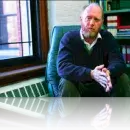
David Haig
David Haig is the George Putnam Professor of Biology at Harvard University. After receiving his B.Sc. degree in biology with First Class Honors from Macquarie University in Australia, Haig left academia, working variously as a dishwasher and clerk. Of this time, according to an interview conducted by the Harvard University Gazette, he says: "I learned a lot about the world, life, and people during the three years I took off. But, after a couple years of stamping documents, I decided that academia was a better place to be. It's not as carefree as the life of a clerk, but it's more intellectually stimulating." He returned to Macquarie University, received his PhD in biology, and moved on to a Royal Society Endeavour postdoctoral Fellowship in plant sciences at St. John's College, Oxford University.
As an independent researcher, Haig’s research has focused on evolutionary theory and has included a range of subjects from maternal-fetal conflict in human pregnancy to the evolution of plant life cycles. He has a particular interest in genetic conflicts within individual organisms, as exemplified by genomic imprinting. His book Genomic Imprinting and Kinship argues that genes of maternal and paternal origin exemplify the conflicting evolutionary forces that arise within an individual. Haig also pioneered an evolutionary approach to understanding diseases of human pregnancy in terms of parent-offspring conflict. He is currently watching moss grow. Haig was a Junior Fellow of the Society of Fellows at Harvard from 1992 to 1995 and was awarded the Dobzhansky Prize in 1995. His publications appear in journals such as Current Biology, Nature Reviews Genetics, and Science.